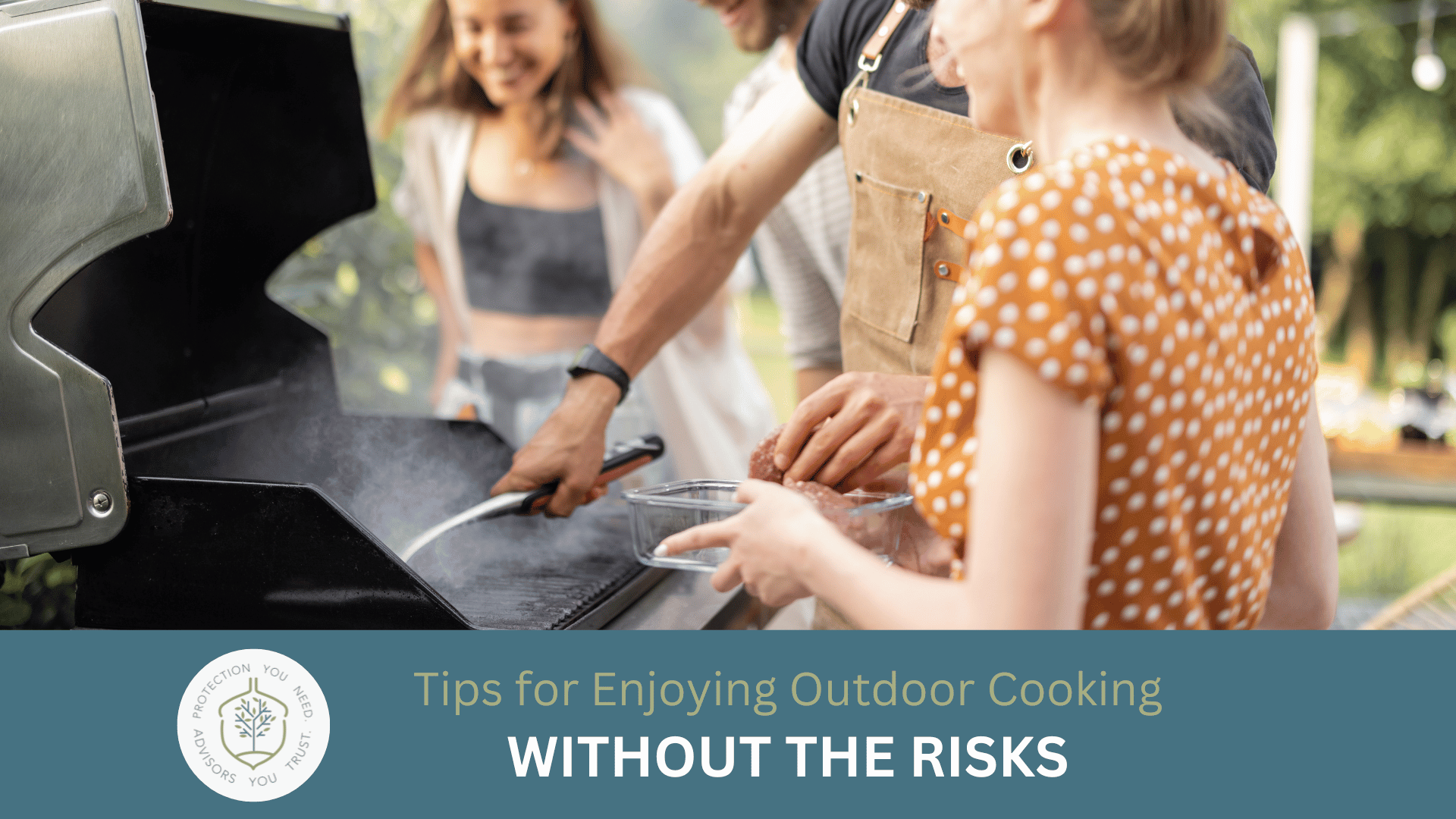Summertime in Louisiana means one thing: firing up the grill and enjoying some delicious backyard barbecue with friends and family.
There’s nothing quite like the sizzle of burgers, the smoky aroma of ribs, and the laughter of loved ones gathered around the picnic table. Amidst all the fun and feasting, it’s important to keep safety in mind.
Outdoor cooking, while enjoyable, comes with its own set of risks, and as a homeowner, it’s important to cook safely outdoors to avoid accidents.
In this blog post we’ll talk about tips for safe outdoor cooking to help make sure your summer cookouts are as safe as they are delicious.
What Could Go Wrong? Risks of Outdoor Cooking
Outdoor cooking is all fun and games until someone gets hurt or something catches fire. It’s not just about burning the burgers or undercooking the chicken.
When you’re dealing with open flames and hot surfaces, there are plenty of risks to keep in mind.
Burns and Injuries
Burns are one of the most common injuries associated with outdoor cooking. Keep a first-aid kit nearby and familiarize yourself with how to treat minor burns, just in case.
Where There’s Smoke, There Could Be Fire
Grills, smokers, and fire pits all have one thing in common: fire. And where there’s fire, there’s always the potential for things to get out of hand.
To prevent accidental fires, watch out for grease flare-ups, be cautious in windy conditions, and never leave your cooking unattended.
Gas Leaks
If you’re using a propane grill, gas leaks pose a serious risk. Loose connections, damaged hoses, or faulty valves can lead to dangerous gas escapes.
Electrical Malfunctions
Electric grills and smokers offer convenience but carry risks similar to any other electrical appliance. They can cause electric shocks or even start fires if they malfunction. Frayed cords, exposed wires, and the presence of water can all contribute to these risks.
Food Safety
Outdoor cooking isn’t just about the equipment – it’s about the food, too. Undercooked meats, cross-contamination, and improper food storage can all lead to foodborne illnesses.
Outdoor Cooking Safety Tips
Now that we’ve talked about the risks, let’s focus on how to make outdoor cooking as safe as possible.
Location, Location, Location
When it comes to setting up your grill, placement is key. Keep it at least 10 feet away from your home, deck railings, and any overhanging branches.
Make sure it’s on a stable, non-flammable surface to prevent tipping, and never leave it unattended.
Keep It Clean
A clean grill is a happy grill. Regularly scrape down the grates, remove grease and debris from the drip pan, and keep the exterior clean.
This not only helps prevent flare-ups but also extends the life of your grill.
Proper Ventilation
Whether you’re using a smoker or a barbecue pit, proper ventilation is a must. Keep your outdoor cooking area well-ventilated and positioned away from windows and doors to prevent smoke and carbon monoxide from entering your home.
Fuel Safety
Store your cooking fuels in a cool, dry place away from heat sources. Keep them out of reach of children and pets. Always follow the manufacturer’s instructions for safe handling and use.
Keep a Fire Extinguisher Nearby
Keep an appropriate class fire extinguisher within easy reach of your outdoor cooking area, and make sure everyone knows how to use it.
Fire Pit Monitoring
Never leave your fire pit unattended, and keep a close eye on children and pets. After you’re finished, douse the fire completely with water, stir the ashes, and douse again to make sure it’s fully extinguished.
Choose the Right Wood
It’s best to use seasoned hardwood or fire pit-specific logs in your fire pit. Soft woods like pine or cedar can produce excessive smoke and sparks.
Separate Raw and Cooked Foods
Keep raw meats, poultry, and seafood separate from cooked foods and fresh produce to avoid cross-contamination. Use separate cutting boards, plates, and utensils for raw and cooked items.
Temperature Check
Use a meat thermometer to ensure your grilled goodies reach a safe internal temperature. Aim for 145°F for beef, pork, and fish, 160°F for ground meats, and 165°F for poultry.
Keep Perishable Foods Refrigerated
Keep perishable foods refrigerated until you’re ready to cook or serve them. Avoid leaving food out in the ‘Danger Zone’ (between 40°F and 140°F) for more than two hours (one hour if it’s above 90°F outside).
If you’re not sure how long something has been sitting out, play it safe and toss it.
Remember, a little prevention goes a long way. Take proactive measures to keep your outdoor cooking area safe.
Read Also: Beat the Heat and Lower Your Electric Bill: Tips for a Cooler Louisiana Summer
If you’re looking for homeowners insurance in Lafayette, Baton Rouge, Franklin, Lutcher, or Abbeville, our local insurance agency is here to help. We can provide personalized advice and a comprehensive review of your homeowner’s insurance policy.
Contact us today for a free consultation to ensure you have the coverage you need to protect your home and family while you enjoy outdoor cooking.
Source: https://www.iii.org/article/grilling-safety-and-insurance


Recent Comments